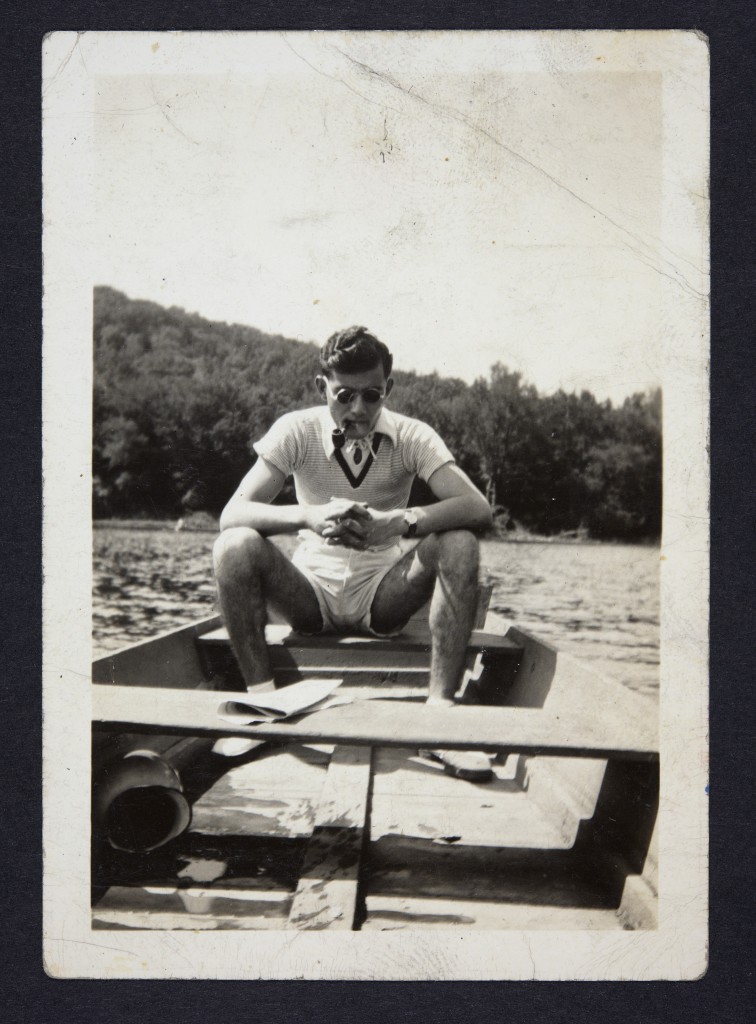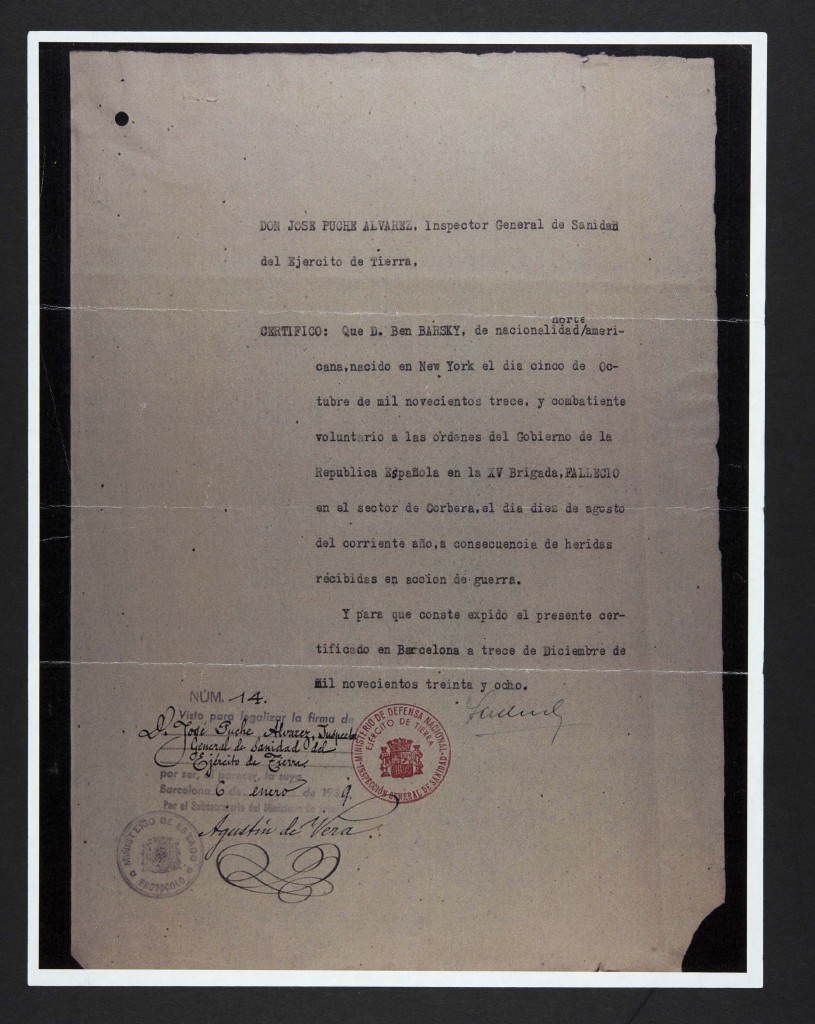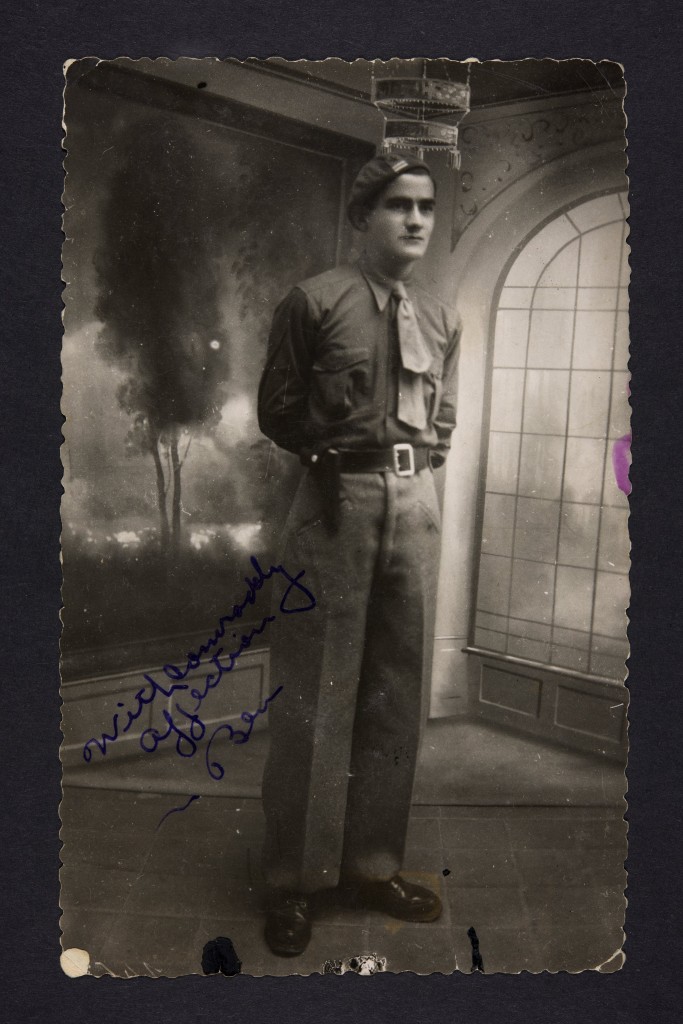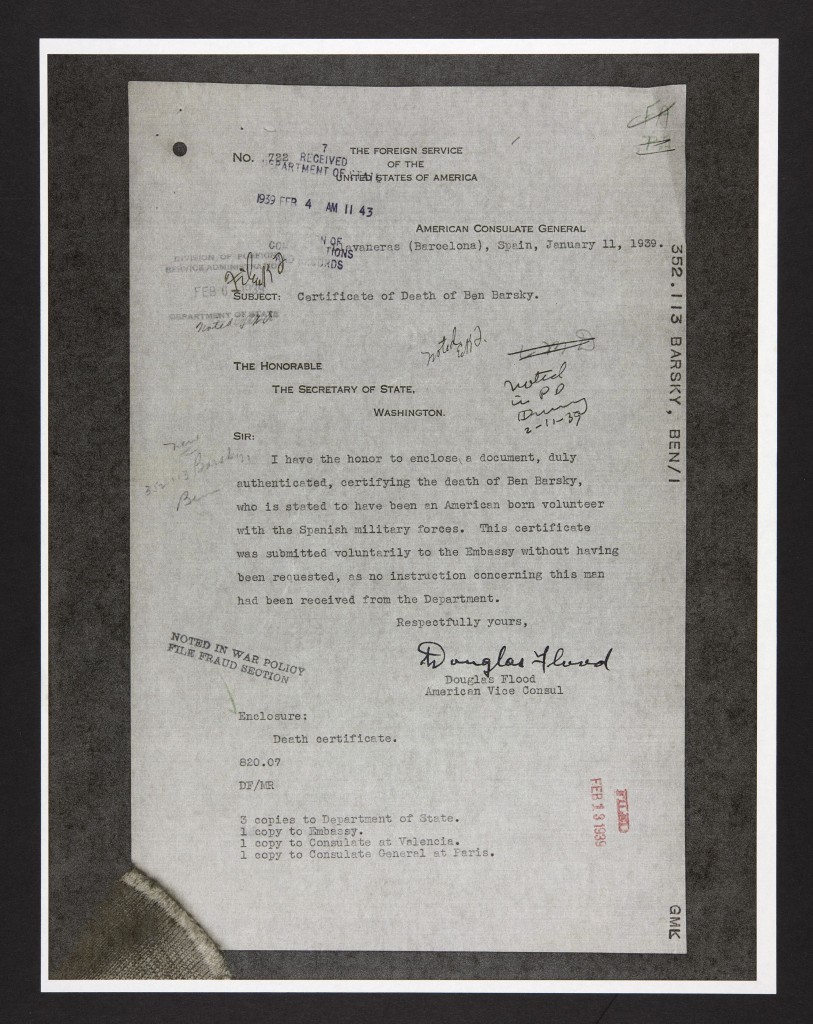Kitchen Table History: In Search of Ben Barsky
Ben Barsky had volunteered for Spain in 1937 and never returned. Why and how did he go? Why did the family never receive any notice of his death? And—perhaps most importantly and painfully—why has Ben’s life and sacrifice been such a taboo subject in the family for so many years? Daniel Czitrom explores the silences in his family’s “kitchen table history.”
In January 1968, while home in the Bronx from my freshman year at SUNY Binghamton, I took a walk with my father to browse at Bookmaster’s on the Grand Concourse, near Fordham Road, the biggest bookstore in our neighborhood. I came upon a copy of Arthur H. Landis’s newly published book, The Abraham Lincoln Brigade, a pioneering work of history that gave us the first comprehensive account of the American volunteers in Spain. I quickly turned to the Index, where I found multiple entries for two of my father’s cousins, Joe and Leo Mendelowitz (Gordon), both of whom were familiar, even celebrated, names in the historical literature.
But it was another, brief Index item that took my breath away: Barsky, Ben, death, 543. Ben Barsky, my mother’s older brother, had volunteered for Spain in 1937 and never returned. The family never learned exactly what happened to him. Now, thirty years later, a diary entry by 19 year old Sam Nahman provided a brief eyewitness account of his death. Nahman recorded the futility of an attack by undermanned and heavily outgunned Republican forces, trying to take a Fascist held hill, nicknamed “the Pimple,” just outside the town of Gandesa. It was August 1, 1938:
We should not have attacked. Company after company went into action there. It was futile. Rose was killed there and Ben Barsky and many others. The 88’s got three tanks in three minutes. The top of the Pimple was fortified. The base was too. It should have been shelled. One battery and we would have had it.
Here, after three decades, was a partial story of what happened to my uncle. But it raised more questions that it answered. Why and how did Ben go to Spain? Why had the family never received any notice of his death from the U.S. government or anyone else? And, perhaps most importantly and painfully, why had Ben’s life and sacrifice been such a taboo subject in the family for so many years?
Kitchen table history can feature silences and repressed memories that need to be probed.
I had to come to terms with the inherent tensions and difficulties presented by “kitchen table history.” All of us learn about the world and about the past through family conversations, stories, and informal accounts, which offer counter narratives to what we get in school or through the mass media. These were especially important growing up in a radical activist family. But kitchen table history can also feature deep silences and repressed memories that need to be probed and interrogated with other sources. In the nearly fifty years since I found that reference to Ben Barsky’s death I have struggled to flesh out his story and clarify exactly what happened to him. All along I have been haunted by what seemed like a conspiracy of silence around his life and death.
After discovering the reference in the Landis book, my mother warned me several times: do not ask Grandma about Ben. I had to respect that, and until her death in 1980 I never heard her even mention Ben. At her funeral one of my aunts made a glancing reference to the loss of Grandma’s oldest son in “a doomed effort to stop the fascist murderers.” My mother Betty, 16 when Ben went to Spain, recalled beautiful letters he had written home; but no one knew what had happened to them. Ben’s older sister, Esther, an active Communist in the 1930s, apparently felt lifelong guilt over helping persuade him to volunteer. But she would never discuss her feelings. All anyone knew for sure was that he had never come back from Spain, and the family had never received any sort of confirmation, official or otherwise, as to his fate.
My mother warned me several times: do not ask Grandma about Ben.
After I became active in ALBA in the early 1980s, I sought out vets who might have known Ben. Several, like Abe Osheroff, recalled him, but only as a name and a face passing through. A common response was to ask if he was related to the famous Dr. Edward Barsky, head of the American Medical Bureau in Spain. (He was not.) It was very difficult to verify even the most basic information: when did he sail to Spain, what unit had he served with, how long had he been there before his death?
A break came in 1989 when I learned that Lincoln vet Irving Weissman and his wife Freda had both known Ben well. Irv wrote that he had crossed the Atlantic with him, and he recalled long discussions with Ben about Ignazio Silone’s 1936 novel Bread and Wine, a stirring novel of anti-fascist resistance in Italy. They later trained together in Tarazona and then lost touch. “What I remember most distinctly,” Irv wrote fifty years after the fact, “is a song that Ben often sang, a Mexican revolutionary song. I remember that song to this day, and sometimes hum it to myself.”
Dijo Emiliano Zapata,
En las montañas sureñas
El pueblo quiere la Tierra,
No quiere estar pobrito.
El pueblo quiere la Tierra,
No quiere estar pobrito.
But it was the poignant handwritten letter from Freda Weissman that gave me the fullest, most human sense of who Ben was. It’s worth quoting at length:
It is hard to believe that it is over 50 years since I last saw Ben Barsky. We worked together in an effort to organize the white collar workers in Wall Street.
We were a cell of the Communist Party composed of people who worked in and around Wall St. We were busy trying to form a union. We juggled Party cell offices among ourselves and as we were not a union yet, we just considered ourselves to be an Organizing Committee for a long time.
We tried to recruit—both Party and Union. For the Union we issued leaflets and a little printed paper called ‘The Wall Street Forum,’ of which I was the editor for a while.
We were, of course, underground as far as Wall St. was concerned. Jobs didn’t grow on trees then, and we all needed the ones we had. To distribute leaflets we had an agreement with garment workers on 23rd St. We would distribute theirs (this was possible for us as their opening time was much earlier than ours), and they always had some unemployed to distribute ours.
The Wall St. Forum was a small, printed periodical, called a ‘shop paper,’ which to us represented a lot of work and effort. Ben, I, and others worked on this paper. All positions and assignments were constantly being juggled around depending on time, energy, health, other obligations, etc. It was not easy to do all this after a day’s work.
As you can tell, I remember Ben very well. He was what is known as a ‘pure soul.’ He was a very gentle, sweet and modest person—bright, dedicated, and extremely able. He was also very handsome. It is strange to be writing about him after all these years. I cared for Ben and, truth to tell, he is one of my treasured memories.
It hardly sounds like someone ready to pick up a gun. Yet in the spring of 1937 Ben volunteered to join the Lincoln Battalion in Spain. The particulars of how he made the decision have never been clear; and details of his time in Spain have been largely non-existent. In this respect his story resembles that of hundreds of others.
Path breaking research by ALBA Board member Chris Brooks, and Ray Hoff, son of vet Harold Hoff, has given us more textured pictures of the lives and experiences of hundreds of American volunteers. Their digging into the recently opened Russian State Archives of Socio-Political History (RGASPI, as well as a variety of recently digitized databases, such as Ancestry.com, has revealed new particulars about Ben Barsky. In addition, using State Department records and recent writings on the Ebro offensive in 1938, I was able to construct a fuller picture of his life and time in Spain. Still, many basic questions remain hazy.
He was the eldest son in a Jewish family living in the Russian shtetl of Lisianka, near Kiev. After spending two years with relatives in Woromin, Poland, near Warsaw, the family emigrated to New York in 1923. Szmul and Miriam Zabarski, 37 and 36 respectively, came through Ellis Island with five children, ages 11 to 1, including Benjamin, listed as 5 years old. They settled in the Bronx where they sold fish in a small store on E. 180th Street, and they eventually changed their name to Barsky. The parents were largely apolitical and deeply valued education. Ben graduated from James Monroe High School, then attended City College for a while. He became active in the Young Communist League in 1934 and then the Communist Party. But his birth year remains murky. In Spain his birth year was given as 1915; the 1930 Federal census listed him as age 14 (1916); the Ellis Island ship manifest had him as 5 (1917 or 18). We know for sure only that he was in his early twenties when he received his passport in April 1937.
His ship, the American Importer, landed in Liverpool May 17, 1937. It was already under State Department surveillance. A British immigration officer quickly forwarded to the American Consulate in Liverpool a list of 28 Americans and 1 Cuban on board (including names, ages, and occupations) suspected of traveling to Spain as volunteers for the Republic. Ben was listed as age 22 and a student. As travel to Spain was illegal for Americans, the group was ostensibly on a holiday trip to France. The volunteers then sailed to Cherbourg, France and, with the help of local supporters of the Spanish Republic, made the arduous trip to the Pyrenees and then crossed into Spain. In Tarazona Ben trained with the Mackenzie-Papineau Battalion, the Canadian unit that included many American volunteers. He then served as a Cabo (corporal) and later acting Teniente (Lieutenant) in some of the worst fighting of the war.
On July 24, 1938 Ben crossed the Ebro with the Mac-Paps, the troops making their way in rowboats, rafts, almost anything that would float. They were part of the campaign to stop the Fascist drive on the Republican capital of Valencia, aimed at cutting the Republic in half. Republican forces quickly managed to open a 50km front armed mainly with rifles, machine guns, and grenades. The Mac-Paps, fighting with British and Spanish battalions, took the town of Asco, capturing prisoners and weapons. They moved into the town of Corbera, deserted after intense Fascist bombing, and were then deployed on the Gandesa-Corbera road toward Gandesa. In response to the initial Republican advance, General Franco ordered a devastating counterattack, rushing to the front fresh troops, massive amounts of artillery, and the latest weaponry from Germany. The Fascist advantage in weapons, a decisive factor throughout the war, was never more evident and frightening. German Messerschmidts and Stukka dive bombers hammered Loyalist forces, and powerful new German 88 mm guns easily destroyed the few Russian tanks supporting Republican troops, a bloody preview of WW II.
As Republican forces moved to take Gandesa, a vanguard of Mac-Paps got within a couple of hundred meters of the strategic town before heavy fire forced them to withdraw. To get at Gandesa, Republican troops would need to take out heavily fortified Fascist forces controlling Hill 481, “the Pimple,” overlooking the town just to the east. The men now dug in as best they could on the slopes and barancas surrounding the town, scraping the rocky soil and piling up stones for cover. There was little real protection from the continual pounding of Fascist planes, mortars, and heavy artillery. On July 27 the British began a series of murderous assaults up the slopes of Hill 481, but they were repulsed by ferocious artillery and aerial bombardment. Bodies lay strewn all over hillsides and the wilting heat soon produced a ghastly stench. By July 30, of the 558 British volunteers who crossed the Ebro, only 150 remained. On August 1 the Mac-Paps relieved the badly mauled British, attempting once more to take the Pimple. It was here, amidst the stink of rotting corpses, screaming artillery shells, and punishing machine gun fire that Ben Barsky lost his life. Hill 481 was never taken.
Bodies lay strewn all over hillsides and the wilting heat soon produced a ghastly stench.
Recently, Chris Brooks found Ben’s Spanish death certificate in the Russian archives. And on Ancestry.com, of all places, I found a letter from the American Consulate in Barcelona, dated January 11, 1939, acknowledging that death certificate (see illustration). None of these letters, or the information they contained, ever made it to the family. There is some ambiguity on the actual date of his death. It is possible that he was wounded and died later, but Sam Nahman’s eyewitness account puts the date as August 1, 1938.
Ben Barsky, the long-lost uncle who has haunted me and my family for so long, has been dead for nearly 80 years. I’ve managed to fill in some pieces of the puzzle, but the sense of loss, the unresolved grief of the family, the pain of a young life cut short, still sting. Alvah Bessie’s Men in Battle, first published in 1939, remains one of the best accounts of the trench level, human experiences of American volunteers in Spain. Bessie, who took part in the Ebro campaign, includes his own thoughts on the profound question of why—what motivated men like Ben Barsky, the “pure soul” in Freda Weissman’s words, to put his life on the line against such long odds?
These men behind these fragile rocks, these men whose tender flesh is torn to pieces by the hot and ragged steel; they could not accept their death with such good grace if they did not love so deeply and so well—were not determined that love must come alive into the world. What other reason could there be for dying? What other reason for this blood upon your hands?
History is what hurts, perhaps most deeply when it is shared over the kitchen table. Silences, repressed memories, and unwillingness to talk are ways to manage pain. We can no longer tap the memories of the vets who made it home, and their generational circle is rapidly fading. But we have new tools and sources to build upon kitchen table history, allowing us to complicate it, deepen it, and understand its enduring connections to the present.
Daniel Czitrom is a Board Chair Emeritus of ALBA and Professor of History at Mount Holyoke College. He can be reached at dczitrom@mtholyoke.edu

















Hi Daniel,
Memory is really the only way to build the pillars of our present. Our present world, where III Reich was defeated and people are not speaking German as universal & superior language Is not for granted. Many people played a function when deciding to fight, and there was a price. My father fought the local Nazis in Argentina, was in jail, persecuted and exiled, and the family was divided between the brothers & sisters who saw him as Robin Hood, and the others who thought that he played to be a hero but all the family paid the price of the retaliation of the government Politic Policemen. Most of the facts are unknown, but it’s very important to build our own narrative with the few pieces of stories and documentation. Fascism never dies, just change fur.